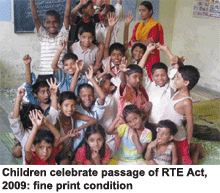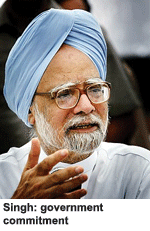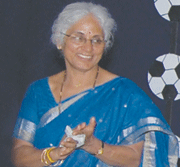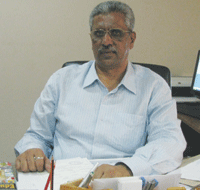Now that the sounds of trumpets, hosannas and celebrations have muted, and academics and education experts have read the fine print of this historic and overdue legislation, they are discovering all kinds of contradictions, infirmities and obfuscations in the RTE Act. EW solicited the opinions of school principals on the impact and implications of the Act. Summiya Yasmeen reports
 Although it required a sustained 20-year campaign by a loose coalition of social activists, educationists, NGOs, and civil society, to transform the idea of the Right to Free & Compulsory Education Act, 2009 (aka Right to Education Act) which makes elementary education a fundamental right of all children aged six-14 years, into legislative reality, the celebrations have been muted since the Act became law on April 1. The enactment of this long-debated legislation prompted a special televised address to the nation by prime minister Dr. Manmohan Singh, in which he proclaimed that approval of the Bill by Parliament was a personal dream come true. “Today what I am, I am because of education. So, I want the light of education should reach to all… The government is committed to ensuring that all children irrespective of gender and social category, have access to education and fund cons-traints would not be allowed to hamper the implementation of the Right to Education Act,” said Manmohan Singh on this historic occasion.
Although it required a sustained 20-year campaign by a loose coalition of social activists, educationists, NGOs, and civil society, to transform the idea of the Right to Free & Compulsory Education Act, 2009 (aka Right to Education Act) which makes elementary education a fundamental right of all children aged six-14 years, into legislative reality, the celebrations have been muted since the Act became law on April 1. The enactment of this long-debated legislation prompted a special televised address to the nation by prime minister Dr. Manmohan Singh, in which he proclaimed that approval of the Bill by Parliament was a personal dream come true. “Today what I am, I am because of education. So, I want the light of education should reach to all… The government is committed to ensuring that all children irrespective of gender and social category, have access to education and fund cons-traints would not be allowed to hamper the implementation of the Right to Education Act,” said Manmohan Singh on this historic occasion.
Union human resource development (HRD) minister Kapil Sibal, who is largely credited with drafting and fast-tracking the RTE Bill through Parliament, called upon India’s 29 state governments to implement the RTE Act vigorously. “Tomorrow will be a historic day as the RTE Act would come into effect. Education is going to be a constitutional right… It is a tryst with destiny in the area of education. Any child can demand his right for education from tomorrow. He will not be denied his right,” said Sibal on the eve of the notification of the Act.
However, now that the sounds of trumpets, hosannas and celebrations have muted and academics and education experts have read the fine print of this historic and overdue legislation, they are discovering all manner of contradictions, confusion, constitutional infirmities and obfusca-tions in the RTE Act. For one, the Rs.1108,749 crore Union Budget 2010-11, presented by finance minister Pranab Mukherjee to Parliament on February 26, which provides an outlay of Rs.42,036 crore for education, took no cognizance of the Right to Education Bill, let alone make financial provision for its implementation.
This despite the Delhi-based National University for Educational Planning and Administration (NUEPA) having (conservatively) estimated that a sum of Rs.178,000 crore over the next five years is required to fund the education of all children in the six-14 age group. Already, disputes have broken out between states (which are obliged to implement the provisions of the Act within their jurisdictions) and the Centre about the proportion in which the additional expenditure will be shared. Some state governments, notably of Uttar Pradesh (pop. 180 million) and Bihar (85 million) want New Delhi to shoulder the entire burden.
 Moreover the hasty passage without adequate debate of the RTE Bill through an unruly Parliament has raised thorny constitutional issues relating to the administrative autonomy of India’s estimated 80,000 privately promoted schools. Therefore, a spate of writ petitions has been filed in the past two months in the Supreme Court challenging the constitutional validity of several provisions of the RTE Act. In particular managements of private independent schools, patronised by the influential middle class, are up in arms against a provision (s.12(i)) which makes it mandatory for them to reserve a 25 percent quota in class I for poor children residing in their neighbourhood.
Moreover the hasty passage without adequate debate of the RTE Bill through an unruly Parliament has raised thorny constitutional issues relating to the administrative autonomy of India’s estimated 80,000 privately promoted schools. Therefore, a spate of writ petitions has been filed in the past two months in the Supreme Court challenging the constitutional validity of several provisions of the RTE Act. In particular managements of private independent schools, patronised by the influential middle class, are up in arms against a provision (s.12(i)) which makes it mandatory for them to reserve a 25 percent quota in class I for poor children residing in their neighbourhood.
On March 9, three weeks before the RTE Act became law, the Jaipur-based Society for Unaided Private Schools of Rajasthan (SUPSR) filed an anticipatory writ petition in the Supreme Court challenging the constitutional validity of this reservation diktat and several other provisions, as infringing upon the fundamental right of minority and private unaided schools to “establish and administer educational institutions of their choice”. “The Act is… violative of the fundamental right of private unaided schools enshrined under Article 19(1)(g) of the Constitution and the minority schools enshrined under Articles 29 and 30 of the Constitution,” says the petition.
This writ petition was admitted on March 22 by a Supreme Court bench comprising former Chief Justice K. G. Balakrishnan and Justice Deepak Verma who initially directed the petitioner to the Rajasthan high court, but later issued notices to the Union HRD and law ministries after SUPSR counsel Harish Salve submitted that the issues involved concerned the entire nation. “We are hopeful that the Supreme Court will consider our legitimate objections and uphold the autonomy of unaided private schools as per the judgements of the T.M.A. Pai Foundation and P.A. Inamdar cases. We are confident that the court will strike down the 25 percent reservation provision in unaided private schools,” says Damodar Prasad Goyal, the Jaipur-based presi-dent of SUPSR which currently lists 100 schools affiliated to the CBSE and CISCE boards in Rajasthan as members.
.gif) Following the SUPSR writ petition in early March, three other petitions filed by associations of private unaided schools (Independent Schools’ Federation of India; Association of Schools of Indian School Certificate Examinations; and Action Committee of Unaided Private Recognised Schools) have been admitted by the apex court.
Following the SUPSR writ petition in early March, three other petitions filed by associations of private unaided schools (Independent Schools’ Federation of India; Association of Schools of Indian School Certificate Examinations; and Action Committee of Unaided Private Recognised Schools) have been admitted by the apex court.
Its impact on the administrative and financial autonomy of the country’s vintage and globally renowned privately-promoted elite schools, which attract students from around the world apart, several other ill-considered provisions of the Act have drawn fierce criticism. For instance, s.4 mandates that every child above six years of age who has not completed elementary education should be admitted in a class appropriate to his/her age. Moreover s. 16 directs that no child admitted in school should be held back in any class or expelled for academic non-performance till completion of her upper primary education. According to R.N. Bhaskar, a well-known Mumbai-based columnist (Business India, Forbes India, DNA), these provisions “could mean the virtual collapse of school education in India”.
“The first clause unwittingly lays emphasis on age and not mental or emotional capabilities of the student. Thus, if a 10-year-old boy approaches a school, he will have to be admitted to std V, because that is the class ‘appropriate to his or her age’ even if the child has not studied for the previous four years. Secondly, when a student knows that he cannot be failed, the pressure on him to meet the minimum benchmarks also gets eased. That encourages students to take their studies and tests less seriously, blunting their competitive skills… The result: a larger number of ‘academically backward’ students will be promoted to the SSC/HSC levels. Many students will approach the job market with the tag of ‘std IX failed’. But potential employers will find their skills levels not matching even std III levels. These are the people who will feel cheated of their right to get a job in society, and could create tremendous social discord, if not riots,” wrote Bhaskar in the Mumbai edition of DNA (May 21).
Another seemingly child-friendly but potentially damaging provision of the RTE Act which outrages Dr. Parth Shah, a former professor of economics at Michigan University, USA and currently the founder-president of the independent Delhi-based think tank Centre for Civil Society (estb.1997), is contained in s.18 (i) of the Act. The section requires every private school to obtain a certificate of recognition from a government authority certifying that it meets all the “norms and standards of a school”. Failure to meet the rigorous (by Indian standards) norms outlined in s.19 — specified land and built-up area, teacher-pupil ratio, library facilities and provision of teaching-learning equipment — within a three-year deadline will result in forced closure. Shah fears that thousands of low-cost private schools across the country — the refuge of poor children fleeing dysfunctional government schools — will be forced to close down.
“Most of these (low cost, private) schools serving the poor will not be able to meet the requirements of the land plot, building specifications, playground and such in the prescribed three years. When they finally close down in 2013, millions of poor students will be forced to sign up with government schools they had once opted out of. Bribes might keep some budget schools going for some time, but with the law stacked against them, anyone hunting for supposed ramshackle fly-by-night ‘teaching shops’ — and there are many (read: leftist NGOs) — can persecute them,” wrote Shah in the Delhi-based business daily The Mint (March 31).
Undoubtedly there are several infirmities, contradictions and grey areas in the RTE Act, 2009 hastily rushed through Parliament without sufficient deliberation and debate. Yet there’s a general consensus that the intent and motivation of this historic legislation — to ensure that all children in the age group six-14 receive primary and upper primary education — is beyond reproach.
Quite clearly, the provisions of this landmark legislation require further debate to rectify its constitutional infirm-ities, contradictions and in particular its deafening silence on ways and means to raise teaching-learning standards in the country’s 1.45 million Central, state and local government schools. To contribute to Parliament’s unfinished debate and to iron out the wrinkles of RTE, 2009 — which could prompt legislative amendments to the Act — EducationWorld solicited the opinions of nine school principals on the possi-ble impact, outcomes and loopholes of RTE, 2009. Their views and insights are presented on the pages following.
“The RTE initiative is under-resourced”
.gif) Peter Mclaughlin is headmaster of The Doon School, Dehradun, rated India’s No.1 boarding school in the past three EducationWorld annual surveys of India’s most respected schools.
Peter Mclaughlin is headmaster of The Doon School, Dehradun, rated India’s No.1 boarding school in the past three EducationWorld annual surveys of India’s most respected schools.
How satisfied are you with the provisions of the RTE Act, 2009?
The RTE Act is a well-intentioned piece of legislation. It tries to address a huge deficiency in the Indian education system and some historic wrongs. But like all legislation, the problems lie, and will lie, in the implementation of its provisions at the state level. My main concern is that the initiative is under-resourced. Rights without the resources to make them a reality are no rights at all. But no professional educator can fault the sentiment motivating the government.
Under s.12 (c) private unaided schools are obliged to admit poor neighourhood children upto 25 percent of capacity in class I. What’s your comment?
The Doon School does not have a class I, so it is not yet clear if the provisions of the Act apply to us. However, this provision will place a considerable burden on many private schools that do have class I and above, and on fee-paying parents. It should be noted that The Doon School already has over 25 percent of its students on scholarships, bursaries and free places.
Under s.16 no child shall be failed or expelled until class VIII. Are you in favour of this provision?
I am not in favour of any provision that takes away from a school the right to expel or hold back a pupil. That kind of intervention has seriously damaged discipline in Western schools. Strong education systems give schools strong powers to deal with academic and behavioural issues. Professional autonomy underpins the best schools.
Under s.13 there is a ban on lump sum admission (capitation) fees and any screening procedures. What are the implications of this provision?
The implications of banning admission fees could be severe for some schools, depending on their financial structures. There will have to be some sort of screening procedures, unless it is intended that all places will be allocated by lottery.
Under s.29 the elementary education curriculum and evaluation process are to be laid down by a government appointed academic authority. What’s your comment?
Government control of the curriculum can be a double-edged sword. There is no doubt that autonomy in this area breeds innovation and creativity. But in poor quality schools, complete freedom and lack of state control and supervision can lead to erratic education provision. In India, there is definitely a role for the government in curriculum design and implementation, but minimal control with plenty of scope for choice and innovation is advisable. In a number of countries a state or national curriculum has been disastrous for the quality of education in schools. Regret-tably, there is little faith in the bureau-cracy in India, so it will be a huge task to convince schools of its effectiveness.
To what extent are you ready to implement RTE in your school in the academic year 2010-11?
As The Doon School is a secondary school with no junior school and no class I entry, we are still seeking clarification on the implications of the RTE Act for us. For instance, it would be an absurdity for The Doon School to admit boys for a year and then have them leave after class VIII when any potential statutory obligation would lapse.
“Act targets private schools”
 Anu Monga is principal of the CIE (UK) and IBO (Geneva)-affiliated Bangalore International School (estb.1969) and chairperson of The Association of International Schools of India (TAISI), with a membership of 40 schools.
Anu Monga is principal of the CIE (UK) and IBO (Geneva)-affiliated Bangalore International School (estb.1969) and chairperson of The Association of International Schools of India (TAISI), with a membership of 40 schools.
How satisfied are you with the provisions of the RTE Act, 2009?
Although the RTE Act is well-intentioned legislation, it has many glaring loopholes. For instance the Act stops at mandating free elementary education. But what will happen to these children after they complete primary school? That’s a big unanswered question.
Moreover the government seems to have completely bypassed the issue of improving its own schools and has passed the onus of providing elementary education to private schools by mandating 25 percent reserv-ation for neighbourhood children. Simultaneously low-cost private schools, to which low-income household children are fleeing from government schools, have been set onerous conditions to qualify for recognition without such requirements being imposed on government schools.
The RTE Act was a great opportunity for the government to improve the infrastructure and academic standards of public schools, and institute a mechanism for teacher accountability. Instead it has used the Act to target private schools.
Under s.16 no child shall be failed or expelled until class VIII. Are you in favour of this provision?
Since most children admitted under the 25 percent quota will be first generation learners and English illiterate, they will require a lot of remedial help. While we try not to fail children until class VIII, we follow a rigorous system of internal assessment under which students’ learning outcomes are constantly measured.
Under s.13 there is a ban on lump sum admission (capitation) fees and any screening procedures. What are the implications of this provision?
It’s very important for schools to screen children before admitting them. This not only helps decide the suitability of the child for the institution, but also enables school managements to map every child’s development according to her background. By banning screening of children for admission purposes, the government is opening the door to political and bureaucratic interference and corruption.
Under s.29 the elementary education curriculum and evaluation process are to be laid down by a government appointed academic authority. What’s your comment?
What have the state governments done so far to improve their schools? Academic standards and curriculum in government schools are so bad that even the poorest of the poor are deserting them for private schools. There will be complete disaster if the government appointed academic authority is allowed to formulate the elementary education curriculum.
To what extent are you prepared to implement RTE in your school during the academic year 2010-11?
I don’t think BIS is prepared to implement the RTE Act this academic year. We will wait for the court verdict on the many petitions challenging the Act. TAISI will be joining cause with the Society for Unaided Private Schools of Rajasthan, which has already filed a petition in the Supreme Court.
“There has to be screening….”
.gif) Praveen Vasisht is headmaster of the Lawrence School, Sanawar (estb. 1847), a CBSE-affiliated co-educat-ional boarding school with an enrolment of 745 students.
Praveen Vasisht is headmaster of the Lawrence School, Sanawar (estb. 1847), a CBSE-affiliated co-educat-ional boarding school with an enrolment of 745 students.
How satisfied are you with the provisions of the RTE Act, 2009?
It’s a good step towards achieving 100 percent literacy in India, though it will take some time to get the desired results. However the government needs to clarify some ambiguous provisions. Also, there must not be undue interfer-ence from ‘outside’ in the management of schools. Absolute impartiality is a must for any system to work.
Under s.12 (c) private unaided schools are obliged to admit poor neighourhood children upto 25 percent of capacity in class I. What’s your comment?
We don’t have class I in Sanawar — we start from class V. Yet school managements will face financial implications. The government needs to come out with clear guidelines on this issue. Will the government pay the tuition of poor neighbourhood children? Or will the parents of other children have to cross-subsidise them by paying higher tuition fees?
Under s.16 no child shall be failed or expellaed in classes K-VIII. Are you in favour of this provision?
I do not see any problem with this clause. At Lawrence, Sanawar we have already been following this policy for quite sometime, even though there is danger of a fall in academic standards.
Under s.13 there is a ban on lump sum admission (capitation) fees and any screening procedures. What are the implications of this provision?
I am against collection of capitation fees. We have never asked for them. However there has to be a screening process for admission into schools. In particular residential schools need to have a screening process to admit children because of the limited capacity available in their boarding houses. I am sure the government understands this. The purpose of screening is to gauge whether a child will be able to adjust without her parents in a boarding school.
Under s.29 the elementary education curriculum and evaluation process are to be laid down by a government appointed academic authority. What’s your comment?
I do not see any harm in having a common national curriculum. It will be a relief to parents who are in transferable jobs and need to frequently change their children’s schools. A certain amount of uniformity is most welcome. However people appointed to the academic authority must be eminent educationists.
To what extent are you ready to implement RTE in your school in the academic year 2010-11?
Good planning is always required to implement any proposal and schools must set clear goals. Sanawar has drawn up a five-year development plan and it will be amended to accommodate RTE provisions.
“Overdue legislation but…”
 Vandana Lulla is principal of the Podar International School, Mumbai which offers its 1,000-plus students a choice between syllabuses of the Cambridge International Examina-tions, UK and International Bacca-laureate, Geneva examination boards.
Vandana Lulla is principal of the Podar International School, Mumbai which offers its 1,000-plus students a choice between syllabuses of the Cambridge International Examina-tions, UK and International Bacca-laureate, Geneva examination boards.
How satisfied are you with the provisions of the RTE Act, 2009?
This legislation was overdue as education is the foundation block of all development. It’s a most welcome initiative.
Under s.12 (c) private unaided schools are obliged to admit poor neighourhood children upto 25 percent of capacity in class I. What’s your comment?
This is a good initiative to combat socio-economic inequality. However admitting children from poor families in class I is fine, but what happens when they finish elementary school? Will they be able to afford the secondary education provided in the same school? Academic standards and benchmarks in private schools are set higher. What happens when a child cannot cope with the curriculum? Secondly, English being the medium of instruction in most private schools could be a barrier to children from vernacular schools and homes.
Under s.16 no child can be held back or expelled until class VIII. Are you in favour of this provision?
Yes, I am in favour. This should have been done eons ago. It will reduce the stress children experience. If schools practice differentiation in teaching, there will be fewer failures in every grade.
Under s.13 there is a ban on lump sum admission (capitation) fees and any screening procedures. What are the implications of this provision?
Ban on lump sum fees is justifiable only when a school is well established. For new schools, this will become a big impediment to growth. Moreover I believe that a school should know the children it is admitting. Therefore, screening should be done prior to admission while minimising stress for children and parents.
Under s.29 the elementary education curriculum and evaluation process are to be prescribed by a government appointed academic authority. What’s your comment?
Every school has its unique curriculum and special subjects, especially if it’s affiliated to an international board. The curriculum is prepared keeping in mind students’ needs, current trends in education and benchmarks set by the school board. Having a third party frame school curriculums is not right.
To what extent are you prepared to implement RTE in your school during the academic year 2010-11?
Certain clauses of the Act seem rather dictatorial and absurd. They need clarification prior to implementation of the RTE Act.
“Detention is necessary”
 G. Neelakantan is principal of the CBSE-affiliated Sir Sivaswami Kala-laya Senior Higher Secondary School, Chennai (estb.1989) with an aggr-egate enrolment of 1,500 students.
G. Neelakantan is principal of the CBSE-affiliated Sir Sivaswami Kala-laya Senior Higher Secondary School, Chennai (estb.1989) with an aggr-egate enrolment of 1,500 students.
How satisfied are you with the provisions of the RTE Act, 2009?
I am yet to study the Act in detail and as such cannot comment on its provisions and possible implications.
Under s.12 (c) private unaided schools are obliged to admit poor neighbour-hood children upto 25 percent of capacity in class I. What’s your comment?
In principle, this provision seems reasonable and just. Every private school must in addition to its private goals and objectives, exhibit a social responsibility. But actual implementation of this provision could lead to a few grey areas: Will quota students be able to adjust to the new school environ-ment? What will be the basis for selecting the 25 percent quota students? How will the education of quota students be funded — by a government grant or will it be factored into the fees of the remaining 75 percent of students?
Under s.16 no child can be held back or expelled until class VIII. Are you in favour of this provision?
I am personally not in favour of this clause. I agree that no child should be expelled, but class IV onwards detention is necessary for those who find it difficult to cope with academics. However detention should not be the first option of schools. Every opportunity should be given to the student to improve before detaining her.
Under s.13 there is a ban on lump sum admission (capitation) fees and any screening procedures. What are the implications of this provision?
All schools charge a lump sum admission fee. This is a one time charge payable by the parent and there’s nothing wrong with it as long as the fee is reasonable. However, I am totally against the concept of capitation fees or what institutions call donations.
How can schools admit students if the demand for admission exceeds supply? There has to be a screening process, but it must be transparent and communicated to aspiring parents.
Under s.29 the elementary education curriculum and evaluation process are to be prescribed by a government appointed academic authority. Currently schools have the freedom to set the curriculum upto class VIII. What’s your comment?
There’s no harm in having a stand-ardised curriculum set by government. The disadvantage of allowing schools to formulate their own curriculums is that some could overload the curri-culum, while others could dilute it. Similarly flexibility in the evaluation process could also lead to arbitrary practices. Standardisation is welcome, but should be implemented without bias and schools should not be penalised for non-academic reasons.
To what extent are you prepared to implement RTE in your school during the academic year 2010-11?
This has to be discussed with the school management committee.
“Improve government schools”
 Vijayalakshmi Srinivasan is principal of the Lady Andal Venkata Subba Rao Matriculation School, Chennai, a Matriculation board school which will be affiliated to the Tamil Nadu State Board from the academic year 2010-11.
Vijayalakshmi Srinivasan is principal of the Lady Andal Venkata Subba Rao Matriculation School, Chennai, a Matriculation board school which will be affiliated to the Tamil Nadu State Board from the academic year 2010-11.
How satisfied are you with the provisions of the RTE Act 2009?
The RTE Act is long overdue. All of us involved in education have a social responsibility, but some of the provisions of the Act are difficult to implement and we need to debate the repercussions of these provisions. A workable solution has to be found so that the right of all children to education becomes a reality.
Under s.12 (c) private unaided schools are obliged to admit poor neighbour-hood children upto 25 percent of capacity in class I. What’s your comment?
Though a laudable and idealistic provision, it cannot be implemented by law alone. Class distinctions cannot be wished away. Private schools can be coerced to implement this provision but it will be difficult to monitor how well it is being implemented. For the Act to genuinely benefit children, the government needs to address the grievances of private unaided schools. The first is about funds. Private schools have to find extra funds to educate 25 percent students free of charge. The government subsidy that has been promised is just not enough.
Secondly, the social and psycho-logical impact on children from economically poorer sections adjusting in private schools has not been given much thought. A better strategy would be for the Central and state governments to improve the infrastructure of govern-ment schools and provide facilities on a par with private schools. They should promote and develop schools modeled on the Kendriya Vidyalayas. The corporate sector should also be roped in to support the government in implementing the right to education.
Under s.16 no child can be held back or expelled until class VIII. Are you in favour of this provision?
To promote all children up to class VIII is short-sighted policy. Promoting students who have not attained the required academic standards will make the task of teachers very difficult. When a child is unable to cope with academics, he/she resorts to disruptive behaviour.
Under s.13 there is a ban on lump sum admission (caapitation) fees and any screening procedures. What are the implications of this provision?
Admission/capitation fees have to be regularised. The government should permit them taking into consideration teacher-student ratio, infrastructure facilities, maintenance, upgradation of school equipment and future expansion plans of each school.
Under s.29 the elementary education curriculum and evaluation process are to be laid down by a government appointed academic authority. What’s your comment?
The government can lay down evaluation procedures and academic standards/levels for classes X and XII, but must allow schools the freedom to set their own curriculum for all other classes .
“All stakeholders must step forward”
 Ashok Pandey is principal of the Ahlcon International School, Delhi (estb.2002), a CBSE-affiliated school which has 2,200 students and 165 teachers on its muster rolls.
Ashok Pandey is principal of the Ahlcon International School, Delhi (estb.2002), a CBSE-affiliated school which has 2,200 students and 165 teachers on its muster rolls.
How satisfied are you with the provisions of the RTE Act, 2009?
The RTE Act 2009 is the fulfillment of a long standing national aspiration. More than 200 million children are outside the domain of formal education. The provisions of the Act are expressions of national intent. But at the grassroots level realisation of the intent of this historic legislation can’t be solely left to the government machinery. Civil society and all stakeholders in education must step forward to implement the RTE Act.
Under s.12 (c) private unaided schools are obliged to admit poor neighborhood children upto 25 percent of capacity in class I. What’s your comment?
Strict implementation of this provision is necessary. A Delhi or metro city view will not do justice to this provision. Of course the quantum of government compensation to private schools must be clarified, but private school managements must adopt an open, willing and compassionate approach to this issue.
Under s.16 no child can be held back or expelled until class VIII. Are you in favour of this provision?
This provision is fraught with several complexities. Prohibition of detention will dilute the premium on excellence and hard work. But freedom to detain a child shifts the onus for failure to learn entirely on the child and parents.
Under s.13 there is a ban on lump sum admission (capitation) fees and any screening procedures. What are the implications of this provision?
Schools should never demand a capitation fee during the admission process. The ban under s.13 is fully justified. If screening procedures are banned, a draw of lots is the only option.
To what extent are you prepared to implement RTE in your school during the academic year 2010-11?
We are fully prepared to implement the provisions as applicable to us. In Delhi, private schools are already obliged to reserve 20 percent of seats for economi-cally weaker students. We are awaiting clarification whether the old provision will be merged with the new.
Academic standards depression warning
 Dinakar Wilson is principal of the Baldwin Boys High School, Bangalore (estb.1878). A kindergarten-class X CISCE-affiliated school, it has an enrolment of 3,000 students and 126 teachers.
Dinakar Wilson is principal of the Baldwin Boys High School, Bangalore (estb.1878). A kindergarten-class X CISCE-affiliated school, it has an enrolment of 3,000 students and 126 teachers.
How satisfied are you with the provisions of the RTE Act, 2009?
The intent and objective of the RTE Act is laudable though we don’t agree with some of its provisions. Every child has a right to education and it’s the State’s obligation and duty to ensure that no child is denied access to quality school education.
Under s.12 (c) private unaided schools are obliged to admit poor neighourhood children upto 25 percent of capacity in class I. What’s your comment?
This is not a feasible provision as quota students will not be able to cope academically and will also face social adjustment problems. Admitting children according to their age and not academic capability will lead to depression of academic standards. Moreover with no clear guidelines on how these 25 percent students will be selected, there’s the danger that admission of quota students will be controlled by education department officials and local politicians with vested interests.
Under s.16 no child shall be failed or expelled until class VIII. Are you in favour of this provision?
If such a policy is followed, then in class IX almost 25-35 percent of students will be detained. This will lead to student indiscipline and behavioural problems.
Under s.29 the elementary education curriculum and evaluation process are to be laid down by a government appointed academic authority. What’s your comment?
If this happens, academic standards are sure to decline. Schools must be given full academic autonomy to formulate their own curriculums. Baldwin is a 130-year-old school and has established a rigorous curriculum development process which takes into consideration students’ needs and latest pedagogy innovations. Similarly the country’s best private schools prepare their curriculums meticulously.
To what extent are you ready to implement RTE in your school in the academic year 2010-11?
The RTE is an Act of Parliament, and as such we don’t have a choice. For the academic year 2010-11 the admission process is over. We will have to implement it from next year.
Peculiar problems
 Pushpa John is principal of the Maharashtra state government-aided Versova Welfare Association High School and Jr. College, Andheri (W), Mumbai.
Pushpa John is principal of the Maharashtra state government-aided Versova Welfare Association High School and Jr. College, Andheri (W), Mumbai.
How satisfied are you with the provisions of the RTE Act, 2009?
RTE Act, 2009 is a well-intentioned initiative of the Central government. But how far it can be implemented is a big question. As an aided school, we have peculiar problems. We don’t have the capacity to accomm-odate more students. Moreover there is a shortage of good teachers and teacher training is not up to the mark.
Under s.16 no child can be held back or expelled until class VIII. Are you in favour of this provision?
I am not in favour of this provision. After class VIII, it will become extremely difficult to improve learning outcomes, and groom students for the class X board exam. It will lead to imposition of additional stress on high school students. The end result will be that admission into college will become difficult for a much larger number of school leavers.
Under s.13 there is a ban on lump sum admission (capitation) fees and any screening procedures. What are the implications of this provision?
State government aided schools are facing a severe resources crunch. The funds allocated by the government fall short of our requirements and we are unable to provide good infrastructure and other facilities to children. If government bans admission fees, it should provide grants to aided schools.
Under s.29 the elementary education curriculum and evaluation process are to be laid down by a government appointed academic authority. What’s your comment?
It’s a good idea as it will lead to standardisation and introduce academic parity among educational institutions. Currently we don’t have the freedom to set our curriculum as it is being done by the state government.
To what extent are you prepared to implement RTE in your school during the academic year 2010-11?
Implementation of RTE in the academic year 2010-11 depends on when the circular will be sent by Implementation of RTE in the academic year 2010-11 depends on when the circular will be sent by the state department of education. As yet we have received no such circular. The situation will become clearer in June.
Also read: Why the RTE act should be scrapped


























